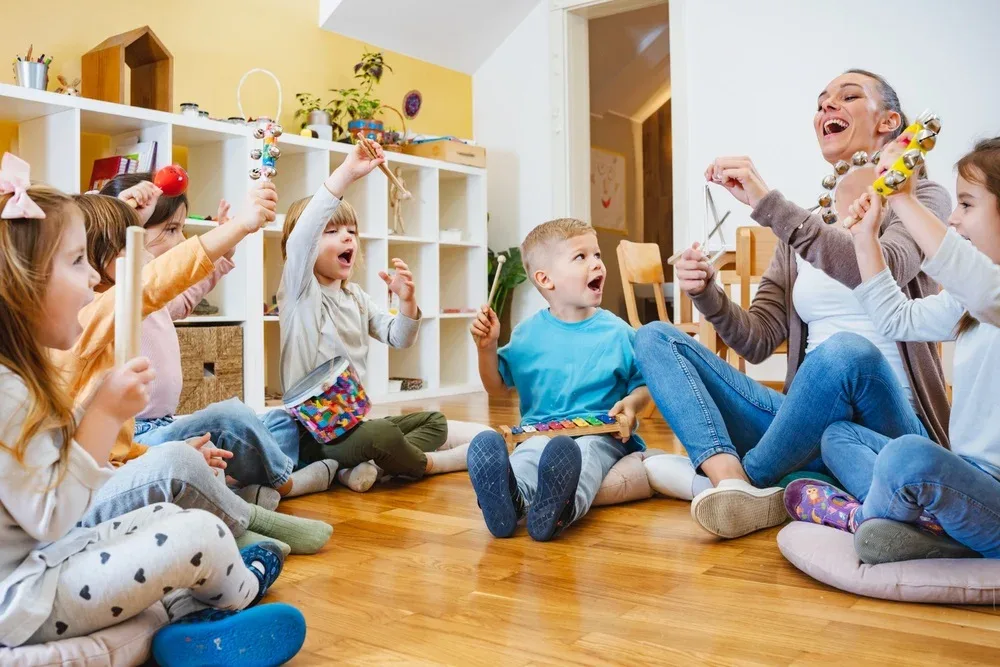
Daycare serves as an essential cornerstone in a child’s early years, offering a place of care and a nurturing environment for social, emotional, and cognitive development. Recognizing the signs your child is ready for daycare ensures a smooth transition into this new phase of their life.
Contents
- 1 Early Signs Your Child Is Ready For Daycare
- 2 Independence and Curiosity
- 3 Communication Skills
- 4 Potty Training Readiness
- 5 Physical Development
- 6 Emotional Readiness
- 7 Behavioral Cues
- 8 Health Considerations
- 9 Parental Assessment
- 10 Preparing Your Child
- 11 Choosing the Right Daycare
- 12 Transitioning to Daycare
- 13 Monitoring Progress
- 14 What’s the Best Age to Start Daycare?
- 15 FAQs
- 15.1 How can I tell if my child is emotionally ready for daycare?
- 15.2 What if my child isn't fully toilet trained before starting daycare?
- 15.3 What should I look for when visiting potential daycare facilities?
- 15.4 How can I help my child adjust to daycare?
- 15.5 What if my child experiences separation anxiety when starting daycare?
- 16 Conclusion
Early Signs Your Child Is Ready For Daycare
Before enrolling a child in daycare, it’s imperative to gauge their developmental milestones and emotional maturity. Though every child is unique, certain age-appropriate cues can provide valuable insights into their readiness. These cues often manifest between 12 and 36 months and encompass various social and emotional indicators.
Independence and Curiosity
A child’s burgeoning sense of independence and their innate curiosity are pivotal factors indicating readiness for daycare. Observing whether the child desires to explore their surroundings autonomously, coupled with growing comfort in novel environments, can offer substantial clues about their readiness to thrive in a daycare setting.
Communication Skills
Effective communication lies at the heart of a child’s success in daycare. Signs of readiness include expressing needs, emotions, and basic desires through words, gestures, or simple phrases. Additionally, a child’s willingness to interact with peers and adults demonstrates their readiness for the social dynamics of daycare.
Potty Training Readiness
Many daycare facilities require children to be partially or fully toilet-trained before enrollment. Hence, assessing a child’s readiness for daycare involves evaluating their progress in toilet training. Signs such as the ability to communicate bathroom needs, a curiosity about using the toilet, and a basic grasp of hygiene practices indicate readiness in this aspect.
Physical Development
Physical prowess and stamina are vital for a child’s participation in daycare activities. Parents should observe whether their child demonstrates steady mobility, adequate coordination, and the stamina necessary to keep up with the daycare routine, which often involves active play and exploration.
Emotional Readiness
Emotional resilience plays a pivotal role in a child’s adjustment to daycare. While separation anxiety is natural, children who are emotionally ready for daycare exhibit a capacity to cope with brief separations from caregivers, regulate their emotions effectively, and seek comfort from trusted adults when needed.
Behavioral Cues
Behavioral observations offer valuable insights into a child’s readiness for daycare. Behaviors such as cooperative play with siblings or peers, the ability to follow simple instructions, and an interest in group activities suggest that the child is socially prepared for the dynamics of a daycare setting.
Health Considerations
Ensuring a child’s health and well-being is paramount when considering daycare readiness. Parents should ensure that their child is up-to-date on immunizations, has undergone necessary health screenings, and that any allergies or chronic conditions are adequately managed to safeguard their health in the daycare environment.
Parental Assessment
Parents play a pivotal role in assessing their child’s readiness for daycare. While trusting parental instincts is crucial, seeking guidance from pediatricians or childcare experts can provide additional insights tailored to the child’s needs and developmental stage.
Preparing Your Child
Preparing a child for daycare involves familiarizing them with the routines and expectations of the setting. Parents can help ease the transition by talking to their children about what to expect, introducing daycare concepts through books or role play, and reassuring them that daycare is a safe and enjoyable place to be.
Choosing the Right Daycare
Selecting the right daycare involves thorough research and evaluation. Parents should visit potential daycare facilities, assess their cleanliness and safety standards, observe interactions between staff and children, and inquire about the curriculum and daily routines to ensure a good fit for their child’s needs.
Transitioning to Daycare
Gradual introduction to the daycare environment can help ease the transition for both child and parent. Starting with short visits or playdates with other children enrolled in the daycare, establishing comforting routines for drop-offs and pick-ups, and maintaining open communication with daycare providers are essential to facilitating a smooth transition.
Monitoring Progress
Parents should remain actively engaged in their child’s daycare experience by communicating openly with daycare providers. Sharing observations and concerns about the child’s adjustment, collaborating with staff to support their development, and monitoring their progress is key to ensuring a positive daycare experience.
What’s the Best Age to Start Daycare?
Deciding on the optimal age to enroll a child in daycare is a significant milestone for many parents, marked by considerations of their child’s developmental readiness, parental work obligations, and personal circumstances. While there’s no one-size-fits-all answer to the best age to start daycare, understanding the factors can help parents prioritize their child’s well-being and early educational experiences.
In this exploration, we explore the various considerations that influence this decision, from developmental milestones to parental needs, to provide insight into finding the right time to embark on the daycare journey. Learn more:
What’s the Best Age to Start Daycare?
FAQs
How can I tell if my child is emotionally ready for daycare?
Look for signs of emotional resilience, such as coping with brief separations, seeking comfort from trusted adults, and regulating emotions effectively, which indicate readiness for daycare.
What if my child isn't fully toilet trained before starting daycare?
Many daycare facilities offer support and guidance with potty training. Discuss your child’s needs with daycare staff to develop a plan meeting their requirements and fostering independence.
What should I look for when visiting potential daycare facilities?
When visiting potential daycare facilities, pay attention to factors such as cleanliness, safety standards, staff interactions with children, and the suitability of the curriculum and daily routines to ensure the best fit for your child’s needs.
How can I help my child adjust to daycare?
Gradually introduce your child to the daycare environment through short visits or playdates, establish comforting routines for drop-offs and pick-ups, and maintain open communication with daycare providers to address any concerns or challenges your child may face during the transition.
What if my child experiences separation anxiety when starting daycare?
Offer reassurance and support to your child, maintain consistency with drop-off routines, and communicate openly with daycare staff to address any concerns or challenges your child may experience, ensuring a smooth transition to daycare.
Conclusion
Recognizing the signs of readiness for daycare empowers parents to make informed decisions about their child’s early education and care. Parents can ensure a smooth transition to daycare that fosters their child’s growth and development by considering developmental milestones, social and emotional cues, and individual needs.
Are you ready to give your child the best possible start in life? Enroll them in DeeCyDa Daycare’s Infant Care Program today and experience the difference firsthand. Our team is committed to giving infants the love, care, and attention they need to thrive. Focusing on nurturing social, emotional, and cognitive development, our Daycare Program sets the stage for a lifetime of success. If you’re searching for “daycare near me” or “daycare in Irvine,” look no further than DeeCyDa Daycare for a trusted and reputable childcare option. Contact us today!

